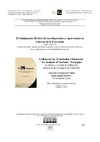Identificador persistente para citar o vincular este elemento:
https://accedacris.ulpgc.es/jspui/handle/10553/70294
| Campo DC | Valor | idioma |
|---|---|---|
| dc.contributor.author | Santamaría Urbieta, Alexandra | en_US |
| dc.contributor.author | Alcalde Peñalver, Elena | en_US |
| dc.date.accessioned | 2020-02-14T13:31:29Z | - |
| dc.date.available | 2020-02-14T13:31:29Z | - |
| dc.date.issued | 2019 | en_US |
| dc.identifier.issn | 2386-3374 | en_US |
| dc.identifier.uri | https://accedacris.ulpgc.es/handle/10553/70294 | - |
| dc.description.abstract | The aim of this study is to examine how students of the third year of a B.A. in Translation and Modern Languages of the University of Alcalá approach the translation of cultural references of the novel Anybody out there by Marian Keyes (2007) according to different strategies of domestication and foreignization. After having explained the theoretical framework included in this article, we handed out an activity with a set of sentences each of which included a cultural reference. The methodology followed was qualitative since the study is based on the analysis of students’ answers to the activity as it will be shown below. Results show that the strategies that students preferred to follow were based on foreignization mainly, since for most cases they did not consider it necessary to add any extra information and did not modify the reference in the ST. This clearly shows the predominant tendency that we can identify nowadays of not adapting cultural references as it was done for example in TV shows from the 80s, where transposition was a key strategy to domesticate the audiovisual content to the target audience. | en_US |
| dc.description.abstract | El objetivo de este estudio es analizar cómo los estudiantes de tercer año del Grado en Traducción y Lenguas Modernas de la Universidad de Alcalá abordan la traducción de las referencias culturales de la novela Anybody out there de Marian Keyes (2007) de acuerdo con diferentes estrategias de traducción de domesticación y extranjerización. Para la realización del estudio explicamos una serie de conceptos teóricos a los estudiantes y distribuimos en el aula una actividad con un conjunto de extractos de la novela que incluían una referencia cultural. La metodología seguida fue cualitativa, ya que el estudio se basa en el análisis de las respuestas de los estudiantes a la actividad. Los resultados muestran que las estrategias que los estudiantes prefirieron seguir se basaron principalmente en la extranjerización, ya que en la mayoría de los casos no consideraron necesario agregar información adicional y no modificaron la referencia. Esto muestra claramente la tendencia predominante que podemos identificar en la actualidad de no adaptar las referencias culturales como se hizo, por ejemplo, en las series de televisión de los años ochenta, donde la transposición fue una estrategia clave para adaptar el contenido audiovisual al público meta. | en_US |
| dc.language | eng | en_US |
| dc.relation.ispartof | El Guiniguada | en_US |
| dc.source | El Guiniguada [ISSN 0213-0610], v. 28, p. 122-137 | en_US |
| dc.subject | 58 Pedagogía | en_US |
| dc.subject | 531204 Educación | en_US |
| dc.subject.other | Cultural references | en_US |
| dc.subject.other | Translation | en_US |
| dc.subject.other | Domestication | en_US |
| dc.subject.other | Foreignization | en_US |
| dc.subject.other | Translation strategies | en_US |
| dc.subject.other | Referencias culturales | en_US |
| dc.subject.other | Traducción | en_US |
| dc.subject.other | Domesticación | en_US |
| dc.subject.other | Extranjerización | en_US |
| dc.subject.other | Estrategias de traducción | en_US |
| dc.title | Culture in the Translation Classroom: An Analysis of Students’ Strategies in translation | en_US |
| dc.title.alternative | La cultura en el aula de traducción: análisis de las estrategias de traducción | en_US |
| dc.type | info:eu-repo/semantics/article | en_US |
| dc.type | Article | en_US |
| dc.identifier.doi | 10.20420/ElGuiniguada.2019.270 | en_US |
| dc.investigacion | Artes y Humanidades | en_US |
| dc.type2 | Artículo | en_US |
| dc.identifier.ulpgc | Sí | es |
| dc.description.sellofecyt | Sello FECYT | |
| dc.description.esci | ESCI | |
| dc.description.dialnetimpact | 0,0 | |
| dc.description.dialnetq | Q3 | |
| dc.description.erihplus | ERIH PLUS | |
| item.grantfulltext | open | - |
| item.fulltext | Con texto completo | - |
| Colección: | Artículos | |
Visitas
84
actualizado el 10-ene-2026
Descargas
101
actualizado el 10-ene-2026
Google ScholarTM
Verifica
Altmetric
Comparte
Exporta metadatos
Los elementos en ULPGC accedaCRIS están protegidos por derechos de autor con todos los derechos reservados, a menos que se indique lo contrario.
